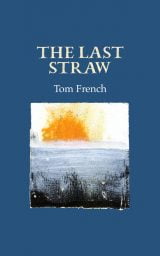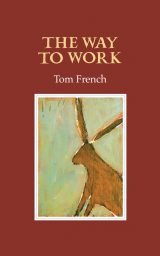From a recent radio news report to the ruminations of a seventh-century saint, the themes of Touching the Bones, Tom French’s first collection, are distinctive and uncommonly wide-ranging.
Straddling the quotidian and classical worlds, his poems embrace a Siberian legend, reflections on twentieth-century wars, intricate family bonds, commemorations of fellow artists, and the domestic lives of newly-weds. The title poem’s attention to a ‘great majestic grief’ is typical of this author’s concerns.
Touching the Bones includes also a number of delicate sequences and his extended rant, ‘Pity the Bastards’, addressing modern values and frustrations. Readers of Tom French’s poems in magazines and audiences of his readings have looked forward to this publication. In work marked by honesty and a sense of dignity, faiths are tested and tried — and found to be strong.
[The poems in Tom French’s Touching the Bones] focus in an almost religious way on human touch. They commemorate moments of contact between tips of fingers and grasping hands as if every human relationship was potentially fleeting or unstable. . . French seems an incredibly patient and unhurried writer. He pays particular attention to what John Ashbery once described as the “thinginess” of the world — the surfaces and textures that make every object individual. As the title poem indicates, touch is nearly always an elegiac gesture in French’s imagination. The living touch the dead only to say goodbye. It is the coldest of human partings that can never be repeated. French captures the desperation and selfishness of such embraces, in particular our inability to let go of the dead person’s body . . . While French is obviously a master of the poetic delivery of emotionally concussing shocks, he is also capable of wonderful moments of absurdity. — Jonathan Ellis, Metre
Tom French’s Touching the Bones (2002)
His poems focus in an almost religious way on human touch. They commemorate moments of contact between tips of fingers and grasping hands as if every human relationship was potentially fleeting or unstable. In contrast to Armitage, French seems an incredibly patient and unhurried writer. He pays particular attention to what John Ashbery once described as the “thinginess” of the world — the surfaces and textures that make every object individual. As the title poem indicates, touch is nearly always an elegiac gesture in French’s imagination. The living touch the dead only to say goodbye. It is the coldest of human partings that can never be repeated. French captures the desperation and selfishness of such embraces, in particular our inability to let go of the dead person’s body:
We grieve because the dead forget us.
We bury their bodies in boxes underground
and when we chance on them in sleep
and reach to bring the skulls up to our lips
to slake our griefs in their crevices and curves,
to roll the shinbones and the thighbones
and the ribs in dust, to touch them with our flesh,
our dream hands reaching toward them make us wake.
Such moments are reminiscent of Shakespeare’s Hamlet, Bronte’s Wuthering Heights and perhaps any poem or story in which a grieving speaker attempts to use “dream hands” to touch an imaginary alive person. French is of course describing a universal nightmare most of us probably recognise, one from which we wake only by shaking ourselves out of sleep. Yet as Shakespeare also said, the dreamer and the poet are often close bedfellows. The “dream hands” of the mourner reaching across space to disturb an unresponsive other seem also to be the roving hands of the poet reaching across the page to wake the reader. French is rattling our shinbones and thighbones too. In the best Metaphysical tradition, he makes us shiver at the noisiness of mortality and its proximity to our own flesh. The best poems in the collection all re-enact this moment. They place us not just near death, but right alongside those who are about to experience it. “Night Drive”, like “Touching the Bones”, is another chilling poem about a fairly normal occurrence: a sheep stepping out in front of a car. It describes a further moment of touch, this time a mother grabbing her son’s hand as she anticipates a car crash:
Something stepped into our beam and stood there,
dumbly, ready to confront its death.
I remember your right hand in the darkness
A white bird frightened from its fastness
in your lap, bracing yourself for the impact,
hearing you whisper ”Jesus” under your breath,
preparing your soul for the moment of death
Then, just as suddenly, nothing happened
the sheep stepped back into the verge
for no reason, attracted by a clump of grass.
For days I felt the pressure of your hand on mine.
You would’ve led me to the next world, Mother, like a child.
There is a coolness about the poem that is not just confined to the ice on the road. Mother and son never communicate with each other in spite of their shared traumatic experience. The son remembers his mother’s right hand as if it were a locked-up creature about to be freed: “a white bird frightened from its fastness”. The alliteration backs up the sense of the words that this is a person who feels almost claustrophobic inside her own body — the cramped consonants functioning like a verbal equivalent for her imprisoned state. So tight is the mother’s control over her body, she even whispers “Jesus” under her breath. Mother and child are completely separate as they confront death. In fact, it is almost suggested that the mother may welcome the oblivion death brings. For days afterwards, the son feels “the pressure” of her hand on his. This could be interpreted as no more than a gesture of panic were it not for the final line of the poem in which the son suggests that the mother may actually have been leading him “to the next world [ … ] like a child”. This is an image not of comfort but of trickery-more Pied Piper than pieta. A night drive that almost ends in literal death thus somehow releases feelings that the son may have preferred metaphorically dead.
While French is obviously a master of the poetic delivery of emotionally concussing shocks, he is also capable of wonderful moments of absurdity. In “The Post-Hole”, for example, he celebrates Saint MacAemoc’ s decision to dig an enormous hole at the bottom of a field in order to have some “respite from the life of the mind / and divine contemplation”. The local farmers, understandably curious about MacAemoc’s behaviour, seek out his explanation whereupon they receive the following logical if not particularly spiritual interpretation:
The sight of the saint crouched down in it
stopped them in their tracks. He was grunting
under the shovelfuls of muck he was flinging up,
pumping sweat and cursing when he struck rock,
easing the welt in his palms with gobs of spit,
his cassock knotted at the knees to keep it clean,
his boxwood crucifix and beads lying in a heap
beside the hole because they were a hindrance
to the work. When the farmers sought to divine
the meaning of this sight and asked the saint,
he explained to them what they already knewthat
the post-hope for the corner post-the one
he was digging-needed to be that much deeper
for the post to take the strain and the fence to last.
MacAemoc gets back to earth by literally digging into it. He restores communication between the monks and lay people by downing his beads and cassock and labouring for his living as they do. There is perhaps an allusion to Seamus Heaney’s “Digging” here. Could the slightly absurd figure of MacAemoc “grunting” and “cursing” in the dirt be a sidelong swipe at Heaney’s own form of turf-flinging? Whatever the case, it is clear French is at least attracted to the Heaney-Hughes axis that still dominates modern poetry. This is not always a good thing. Poets need predecessors, as Amy Clampitt once suggested, but they also need to dig their own holes in the dirt. If I have any qualms about French’s general direction, it is the narrowness of the tradition from which he springs. Not all mentors are good advisors, nor are all poet-heroes necessarily good influences. As French admits in “Striking Distance”: “I learned about love on a Templetouhy bog”. In his second book, I trust he can get out of the bog (however comfortable and reassuring it may seem) and move into a wider poetic world. French is a more gifted poet than Armitage, though they share a similar problem. Having perfected the art of fitting in, they now need to stand out.
— Jonathan Ellis, Metre
Winner of the 2002 Forward Prize for Best First Collection
Winner of the inaugural Ted McNulty Prize




